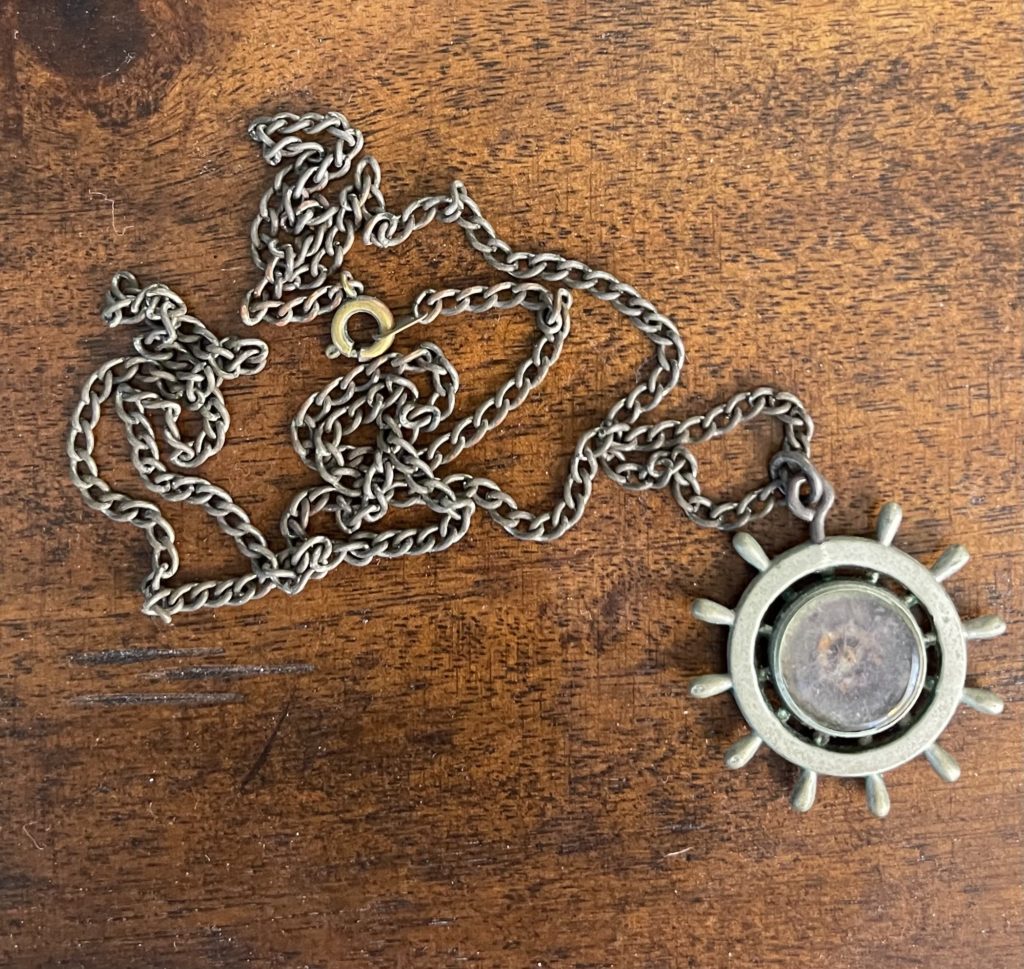
I went to my first estate sale on Saturday, and I discovered they’re sad; someone’s life with dangling white price tags. In this modest Glendale house lived an elderly woman, a fire-and-brimstone Baptist from what I saw on her bookshelf, who’d been moved recently to assisted care.
I bought one of those fussy old Art Deco vanities with the over-sized mirror and Bakelite pulls, a place where perfume bottles once held court to the doilies. Also purchased was a 1932 set of encyclopedias, handsome and leathery. Putting my negotiation and bullshit skills in action (I handed one of the guys running the show my business card and told him that estate sales might make a fascinating show, which they totally wouldn’t, but I’ll try anything for a good deal), I got them both for less than half price.
Carrying the vanity, I sweated my way out of the house now crammed with people including four hefty ones who were dressed for the Renaissance Faire, and I lost my necklace, something as permanent on me for the past four years as the tattoo on my chest. It was just as I sidled in the vanity’s matching bench into the back of the Explorer that I noticed it gone. It could’ve been anywhere and anyone might have nabbed it.
I panicked. Up until Billy died, the chain hung from our medicine cabinet, a daily reminder that no one in our little family was lost.
The necklace is compass fob that I bought Billy as a souvenir while I was in London with a good friend of ours who was co-starring in Hackers. On the flight over, Alberta Watson and I watched The Client while lounging in our little slippers given to travelers in first class. In one key scene, Susan Sarandon leans down to her little co-star and gives him a compass on a chain. She tells him that if he’s ever lost, just hold that compass tight and it would bring him right back to her.
I knew immediately what I wanted to find in London.
The problem was that I didn’t know the word “fob,” so I roamed from store to store trying to explain in my best pantomime that I wanted a little compass on a chain. I received a lot of those looks that said I was a pitiful American and they’re lucky an ocean separates us.
Finally, I wandered into an antique mall near Covenant Square where I found two: a solid gold one I couldn’t afford and the other a small gold plated fob shaped like a ship’s captain’s wheel. I bought the latter because I liked the connection between it and Billy’s service in the Navy, and I also had enough in my pocket to actually make the purchase.
When Billy opened the box, he gave me a you-know-I-don’t-wear-necklaces look, and I said, “Now if you’re ever lost, you can always find your way home.” He smiled broadly, gave me a peck on the lips before I helped him clasp it in place. After about two weeks, it found its home dangling from the corner of the medicine cabinet.
I walked from my car to the house and back over the lawn, looking for any glint in the sun, any sign of the necklace. I was wild-eyed. One more thing lost forever. One more piece chipped away. How am I going to find my way home without it? The man to whom I gave my card saw me combing through the grass on all fours when he came out to see if he could help.
“I lost my necklace.” My hand went to my throat reflexively and my throat choked out the words. I avoided his eyes. He started to study the spot where I was kneeling, and said he’d go look in the house. He came back empty handed as I was making my tenth or thirtieth navigation of the lawn.
“I promise I won‘t do this all day.” My pained smile shot at him, which made his feet shift a little. I was about to completely lose my balance when I spotted it, lying there lazily, just as I’d about given up all hope of seeing it again. “Oh God.” I grabbed it and held it to my chest, my eyes welling over their brim.
“I’m glad you found it. I can see how much it means to you.”
“Means the world.” I thanked him for his help and quickly climbed into my car. I slid the chain over my head around my neck and held that compass tight, crying at its near-loss.
“I found it, baby. Now I’ll be able to find you. You’re my Guyster and I love you.” That’s exactly what I said in full voice with the windows rolled up in front of a modest house in Glendale where an elderly woman once lived.
WRITTEN 05/09/2006
